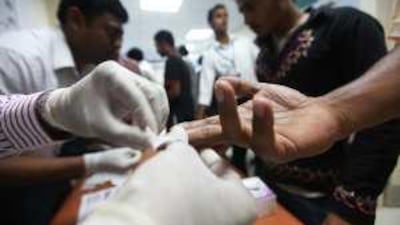ABU DHABI // Hassan Mohammed was feverish and in pain as he stood in line, wrapped in a shawl, in Mussafah labour camp. He had tried to use his health card at a private hospital, he explained, but had been turned away. The Pakistani construction worker was one of hundreds of labourers who took advantage of a free medical camp set up yesterday to help those with inadequate health coverage.
"Last year I used the card and it was fine," he said. "But recently it has stopped working. I am not sure why. I have not been able to go to work because of this pain all this week so I have come here." The Lifeline Hospital, along with the Thiruvananthapuram District Expatriates Association, an organisation of Indian professionals from a city in Kerala, joined up to provide free health care services for a day in Mussafah.
Although all companies in Abu Dhabi must provide health insurance for their workers, most unskilled and semi-skilled workers have only basic coverage. Often, it does not cover the cost of prescriptions, specialised health check-ups or treatment in private hospitals. Despite gloomy weather, workers started arriving at the lobby of the Lifeline Hospital as soon as it opened its doors, at 9am. Within a few hours, doctors had already treated more than 450 patients. Physicians expected to see at least 1,000 patients by 4pm yesterday.
Hafiz Abbas, a crane operator from Pakistan who has been in the UAE for six months, went to the medical camp with a persistent fever and a cough. He said he had been treated by an on-site doctor at work for the past two weeks, but the prescriptions written for the drugs were not covered by his health card. He had brought samples of his medication with him, and said he could no longer afford to continue paying for refills.
"The health card is fine for one or two check-ups a year," said Mr Abbas. "But if you have a problem that goes on for a long time, then it stops working." SK Abdullah, the manager of operations for the Lifeline Hospital, said that he had seen a number of cases with expired health cards and some whose health insurance for the year had yet to be renewed. Although workers arrive on three-year work permits, it is not unusual for most companies to renew health insurance on a yearly basis.
Alam Khan, a mason from Pakistan who works for a Dubai-based company that has sent him to work in Al Ain and Abu Dhabi, said his untreated back problems had led to pain and numbness down his left leg. "Last year, there was less work so my earnings went down," he said. "But the medical expenses remained the same." He borrowed Dh150 (US$40) from friends in Al Ain last year after being unable to afford the prescribed medication. When it ran out, Mr Khan resumed work.
The pain returned last week, along with Mr Khan's anxiety about losing working days and having to pay more medical bills. "Last year, after I paid Dh450 for my back-pain medicines, I stopped buying them," said Mr Khan. "I could not afford it any more. There are other expenses I have to take care of before buying medicines." Dr Shajir Gaffar, the corporate relations manager with the Lifeline Hospital Group, said 15 doctors provided general check-ups and specialised services in the fields of dermatology, orthopaedics and ophthalmology. Some of the services provided yesterday are not usually covered under basic health plans.
"We see a lot of cases of dermatitis, because a lot of workers become sensitive to cement," said Dr Usman Jasmine, a plastic surgeon with Al Mafraq Hospital, and a member of the association. Areas were set up to check blood-sugar levels, glucose, cholesterol and body mass indexes (BMI). "The screenings give you an idea of what this demographic suffers from," said Dr Gaffar. Many people screened yesterday suffered from Type-2 diabetes.
"It is hereditary, and that plays a big role," said Dr Gaffar. "Most don't screen themselves, and they are not aware of the lifestyle changes that should be made when diabetes occurs. They are not aware of food habits. In fact, there are a lot of first-timers here." Tariq Mahmoud, a steelworker from Pakistan, said he went to the camp because he suspected that he had diabetes. "I feel a general weakness," he said. "Some of my friends who have similar symptoms that I experience have diabetes, so I came here to get it checked out."
Although Mr Mahmoud's company provides an on-site physician and he has health insurance, he said the doctor mostly dealt with "serious cases" such as falls from buildings or severe dehydration. "He does not prescribe drugs for diabetes," said Mr Mahmoud. @Email:sbhattacharya@thenational.ae

